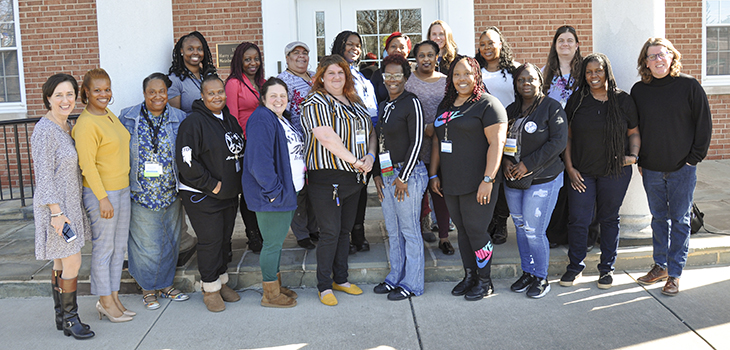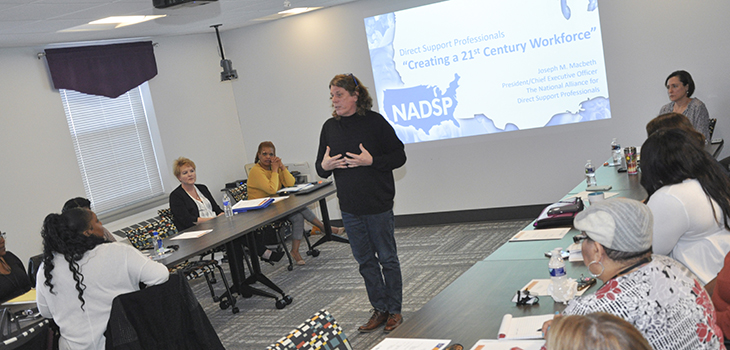 Joe Macbeth, NADSP Executive Director (far right) and Kathleen Durkin, The Arc Baltimore
Joe Macbeth, NADSP Executive Director (far right) and Kathleen Durkin, The Arc Baltimore
CEO (far left), visit with the selected DSPs for E-Badge Academy
The first class of direct support professionals from The Arc Baltimore were assembled in February for the start of an important new initiative – an investment in our staff. It offers training and affirmation of best practices, credentialing and recognition, job satisfaction, and an increase in compensation.
The Arc Baltimore is a member of the National Alliance for Direct Support Professionals (NADSP) and, with pilot funding from our endowment, is now offering the NADSP E-Badge Academy to 17 of our staff.
Through the Academy, DSP staff earn electronic badges based on the competencies they demonstrate and the education they receive through videos and direct training. Three levels of certification are available, with pay increases or bonuses and the job titles that go with them. In addition to the inaugural class of participants, many more staff now have the opportunity to access associated training through the agency’s NADSP membership.
The participants come from across the agency. Project SEARCH, community living, contract services, day services, and family living. Their tenure with us ranges from just over a year to 18 years of employment. Their applications to participate in the academy have two common themes. They want to learn and do better in their jobs. And they want the professional recognition that is offered with three levels of certification.
To kick things off, Joe Macbeth, the executive director of NADSP came in to meet the class. He began by extolling the selection of words in The Arc’s new mission statement, reflecting that a “sense of belonging” is all about inclusion. That “purpose” is all about self-determination. And that “meaningful relationships are what is most important. Joe reflected, “Many people with developmental disabilities are lonely.”

Joe Macbeth addresses the inaugural class of DSPs
His further remarks were both challenging and inspiring. What follows are some of his most compelling statements:
The workforce challenges to recruit and retain quality direct support staff are not new. We can’t call it a crisis anymore because it’s been a crisis for decades. It’s easier to recruit staff than to keep them. We are competing with programs for the aging, substance abuse, and mental health. Direct support work is the fastest-growing occupation in the US and by 2028 it’s estimated the US will need 8 million more DSPs than we have now.
The work is not easy. It’s taxing and can be hard both physically and psychologically. At the same time, some may perceive the work as a dead end, with no way to advance, and of low social value. DSPs need a career ladder so they may earn more, take more satisfaction, gain recognition for their professionalism, and choose to stay in the work.
Times are changing and so is the work. Services are increasingly delivered in self-directed settings without site supervision and limited training. This can be professionally isolating. Public funding is changing as well and becoming more complicated.
There are no simple solutions to address the workforce issues. We need complex approaches to fix decades of wrong. Funding has not kept up, and in fact has eroded. Don’t pretend a 3% increase can fix it when we need 30%. It’s a social justice issue, but the current political climate is less than friendly to the idea of more funds. Cuts to Medicaid are a real threat.
John F. Kennedy, Jr. said “Quality is defined at the point of interaction between the staff member and the individual with a disability.”
The essentials of the E-Badge Academy are simple – to convey the KNOWLEDGE AND SKILLS AND VALUES that determine quality support. The training is based on sound research, the skills are tied to key competencies, the values from a clear code of ethics. The opportunity for each of our participants is to earn badges in 12 competency areas.
While DSPs were seen historically as caretakers with custodial duties who provided companionship and “coverage” to assure health and safety, we see the role now as much more.
DSPs must be ambassadors, coaches, and mentors. They must be culturally competent, support informed decision making, must assess risk, and increasingly use technology to aid human growth and independence.
While the past was to blindly follow a plan, fill shifts, go on outings, and subscribe to a system centered approach, now we create plans WITH the person. We help the build meaningful relationships. It’s inclusion, not recreation. It’s advocating with and not for, it’s presuming competence and focusing on skills, not need.
It’s the future that offers more of life to people with disabilities.
Stay tuned for more about the new e-badge credentialing program at The Arc Baltimore. We will be celebrating those who attain their first certification level and hearing from them as to how they see and do their work differently and what they hope to accomplish with the people they support.

